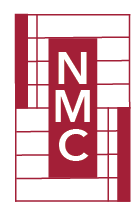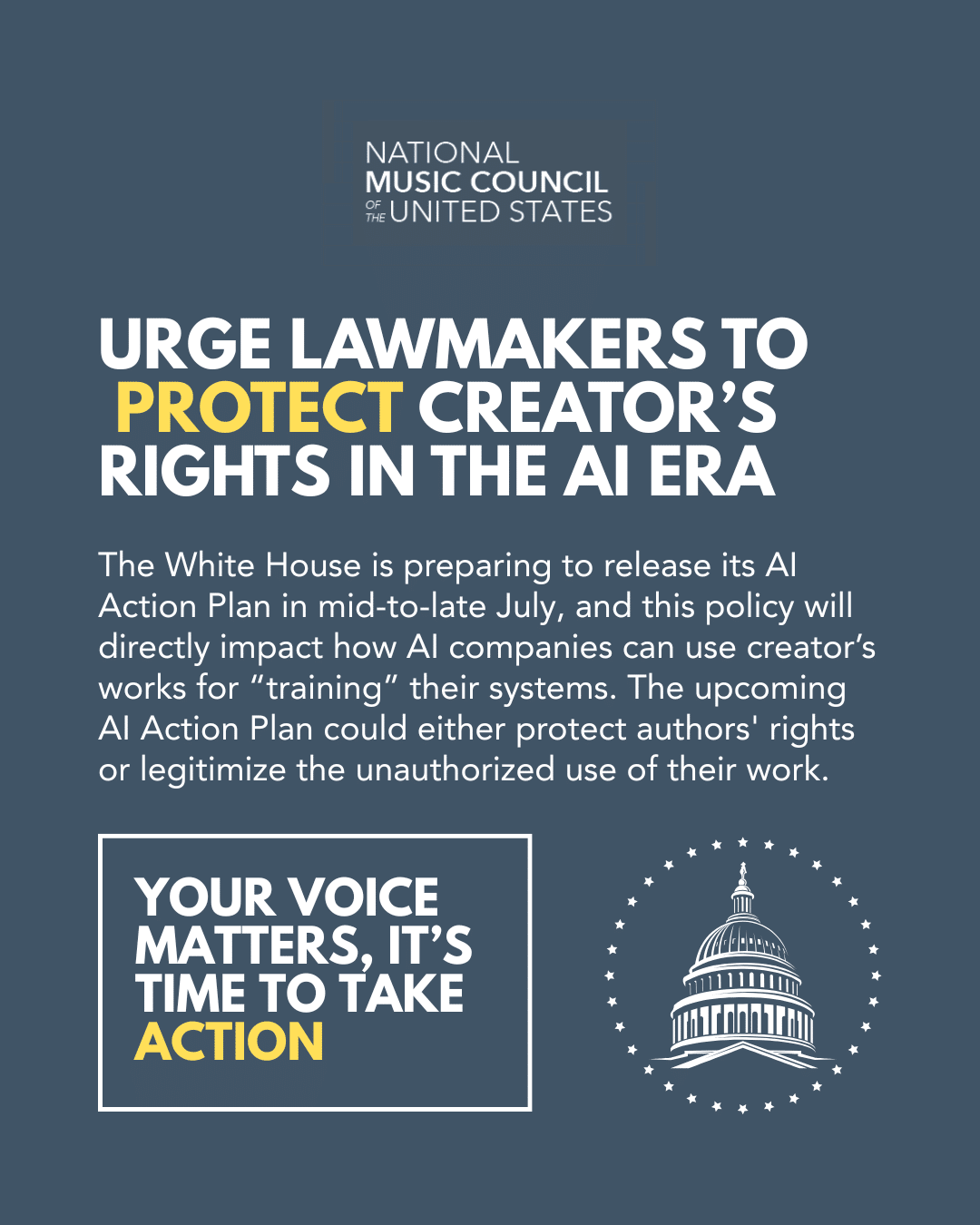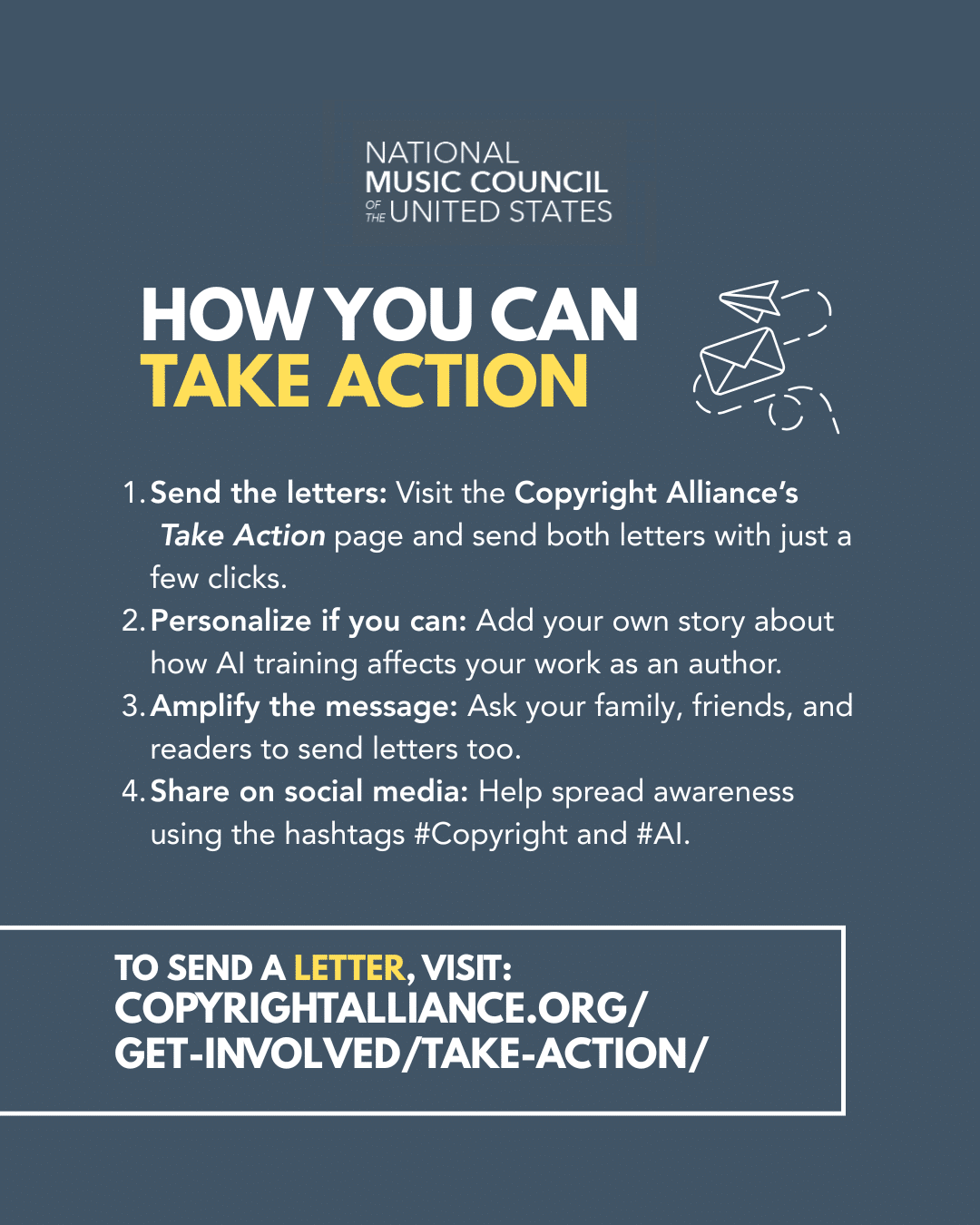The White House is preparing to release its AI Action Plan in mid-to-late July, and this policy will directly impact how AI companies can use authors’ works for “training” their systems. Most of them now use unlicensed works to create content that competes with authentic, human-authored work. The upcoming AI Action Plan could either protect authors’ rights or legitimize the unauthorized use of their work, and we have a narrow window to influence this crucial policy.
Visit the Copyright Alliance’s “Take Action” Page to send your letter today: www.copyrightalliance.org/get-involved/take-action/
The proposed FY 2026 budget slashes over $4.5 billion from K–12 education and eliminates key arts funding by merging 18 grant programs, including support for music, theatre, dance, media arts, and visual arts.
Congress has the final say and your voice matters. Take action today. Tell your elected officials to protect and increase funding for arts education.
To write to your elected officials, visit: nafmeorg.quorum.us/campaign/121747/
A struggle appears to be taking shape between the Congress and the Executive branches of the US Government over control of the Copyright Office and the Library of Congress. The resolution of this separation of powers issue could have strong and longstanding repercussions concerning future US IP protection policies. SGA and SCL are among those groups that have sent letters of support in favor of continued Legislative Branch oversight.
NMC Chair Charlie Sanders (representing SGA), Todd Dupler of the Recording Academy and Ashley Irwin of SCL helped lead the 2025 World I.T. Day observances on Capitol Hill organized by the US Copyright Alliance in conjunction with the US House of Representatives. The April 29th program also included welcoming speeches by Reps Judy Chu (D-CA) and Ben Cline (R-VA), who were among the many interested Congressional members and staffers to attend.
The message championed by the NMC attendees was the importance of protecting the enormous cultural and commercial benefits garnered by the United States through its music community. Sanders’ comments, included below, are representative of the view that the “soft power” of American music is one of the greatest assets the United States has in regard to international diplomacy, and must be safeguarded to the greatest extent possible.
For more than three decades, it’s been my privilege as an adjunct professor of law and music history at New York University to help students gain a sense of pride for the incredible catalog of works that comprise the American musical repertoire. I’m pleased to report that even after all this time, doing so still requires only to underscore the obvious.
Over the past century and a half, American composers, songwriters and recording artists have not just led the world in musical creativity. They have utterly dominated that space during a golden era of 20th century excellence, and continue to do so today. A recent recording industry study of global music distribution found that American songs and recordings continue to comprise a huge percentage of the music charts throughout the world, often constituting upward of an astonishing 90% of the top numerical positions.
There’s more. Solely in terms of hard numbers, the US music industry contributes well over an enormous $200 billion annually to the American economy (GDP), supporting some 2.5 million jobs and over 250,000 music venues and establishments. But even those eye-opening statistics tell only part of the story behind the economic and cultural engine that is American music.
This level of sustained cultural and commercial achievement cannot rationally be attributable to mere chance. Rather, it stands as a living tribute to the unique quality of America’s creative melting-pot. Starting in New Orleans during the 1800s with the synthesis of musical influences from around the world into jazz, gospel and blues, the US music creator community –supported by legal protections and economic incentives provided by Congress– has succeeded in fostering the advancement of the musical arts in America to the very highest levels of human achievement and commercial success.
The benefits of this phenomenon, however, go far deeper than the billions of dollars in US GDP they produce. By consistently creating the music the world loves, the United States has realized political, social and economic value far beyond the balance of trade benefits music sustains. It has, in fact, helped produce the rarest of all geo-political commodities: lasting good will.
To fully appreciate the value to the United Sates of that intangible, good will element — and the need to continue to nurture and protect it– it’s crucial to understand the nature of music itself as the most uniquely passionate and persuasive artistic discipline. Those characteristics have a great deal to do with the extraordinary influence and soft power music produces throughout the world, often to America’s enormous benefit.
As the iconic American photographic artist and amateur pianist Ansel Adams explained it, music is undeniably the most expressive of the arts, surpassing even photography in its ability to convey a message of deep emotion with immediacy. Music’s almost magical ability to inspire genuine and enduring human feeling, whether spiritually or intellectually based, simply makes it more affecting than any other art form. Grasping that distinction makes it easier to understand the extraordinary influence of music creation on American culture, and of American music on the world.
When singer/songwriter Billy Joel was inducted into the Songwriters Hall of Fame a number of years ago, he spoke of an epiphany he had concerning what American music has meant to the world. Performing the very first foreign rock concert in Moscow following the initial relaxation of the Soviet Union’s “iron curtain” policies in 1987, Joel spoke of being terrified that those who showed up to see him would know nothing about either his music or the American rock and pop tradition.
His shock at hearing Russian fans cheering wildly and phonetically singing his lyrics back to him in English, as well as the lyrics of Buddy Holly, Chuck Berry, Carole King and other legendary American songwriters, opened his eyes to the reality that music had been a Cold War bridge between America and the rest of the world all along. He was both thrilled and moved, he said, realizing the role music has played in humanizing relations even among people who had been taught to view one another with grave suspicion.
American folk music giant Pete Seeger had the same experience in Barcelona after the fall of the Franco regime, as did US rocker Steven van Zandt in Johannesburg following the end of apartheid. The crowds joyfully sang the lyrics of freedom right back to them.
In short, the affection for American music around the world as an emblem of free expression and democracy had made it one of our nation’s most important exports, a non-partisan gift to the world that redounds to our global benefit every single day across every economic, political and social sector.
The blessings that American music has brought to the citizens of our own country, however, are of an even greater magnitude. Throughout our history, not a single, popular social movement, not a single time of tragedy to be overcome, and not a single defense of freedom in war, has been conducted without the crucial influence and soft power of music being brought to bear for the greater good.
None other than the quartet of Abraham Lincoln, Henry Ward Beecher, Frederick Douglass and Harriet Beecher Stowe utilized the magnificent Anglo-American hymn “Amazing Grace” to champion an end to slavery in the days leading up to the Civil War. Stowe even inserted the lyrics into her landmark abolitionist novel, “Uncle Tom’s Cabin.”
One hundred years later, Dr. Martin Luther King, Jr. began the most eloquent speech of his life by extolling the virtues and strength of the song “We Shall Overcome” and its incalculable contribution to the civil rights movement of the 1950s and 60s.
In 1932, the country was calmed and inspired by lyricist Yip Harburg’s awesome message of proud hope amidst the crushing despair of the Great Depression in his song “Brother, Can You Spare a Dime?” The nation grew more empathetic, according to then-presidential candidate Franklin Roosevelt, as a result.
The examples are legion. But I want to close with one more story involving Yip Harburg that perhaps illustrates the awesome power of American music more forcefully than any other.
It was 1938 when Harburg and his writing partner Harold Arlen sat down and composed what is generally revered as the world’s most beloved popular song, “Somewhere Over the Rainbow.” Most of the song’s millions of devotees cite the hope they perceive as being infused into Yip’s lyrics as the source of the song’s enormous appeal (in addition to its extraordinary melody). In reality, however, the American composers viewed the song as more of a scream of anguish for a world about to descend into genocidal catastrophe, and a prayer for peace that they knew would likely go unanswered.
But those fears and doubts WERE answered, by two other American songwriters named Nat Burton and Walter Kent. They well understood the dark foreboding contained in Harburg’s closing lines sung so poignantly by Judy Garland: “If happy little bluebirds fly beyond the rainbow, why, o why can’t I?”
And so as London was subjected to sixty consecutive days of blitz bombing by the Nazis in an attempt to break the spirit of the British people, and as the nightmare of world war turned into savage reality, Burton and Kent replied to Harburg and Arlen with a new song of their own. “There’ll be bluebirds over, the white cliffs of Dover,” they wrote reassuringly, “tomorrow, just you wait and see. There’ll be love and laughter, and peace ever after, tomorrow when the world is free.”
The heroic English singing star Vera Lynn recorded it, and those two songs became the musical backbone of the morale-lifting spirit that both FDR and Winston Churchill had asked and prayed for in support of the War effort. (A third was “Have Yourself a Merry Little Christmas” by Hugh Martin and Ralph Blane. Take a close listen to the original “we’ll have to muddle through somehow” lyrics of that masterpiece the next time you hear it, and you’ll see what I mean).
That is the soft power of music, comforting, inspiring and lending courage to millions of people in their struggle to rekindle peace and freedom in a world gone mad. The music succeeds, even under the most fraught circumstances of the past two thousand years.
Music creation is among America’s greatest joys, its most lucrative and powerful endeavors, and its most dominant and influential exports. Our goal here today is to point this out in compelling ways, and to ask for Congress’ continuing support through laws that protect the art and commerce of music. We are proud of what we do, we are proud as Americans, and we ask you to join us in turning that pride into positive protections for American music creators.
The effort, we promise, is well worth the return.
Charles J. Sanders is chair of the National Music Council of the United States and Outside Counsel to the Songwriters Guild of America.
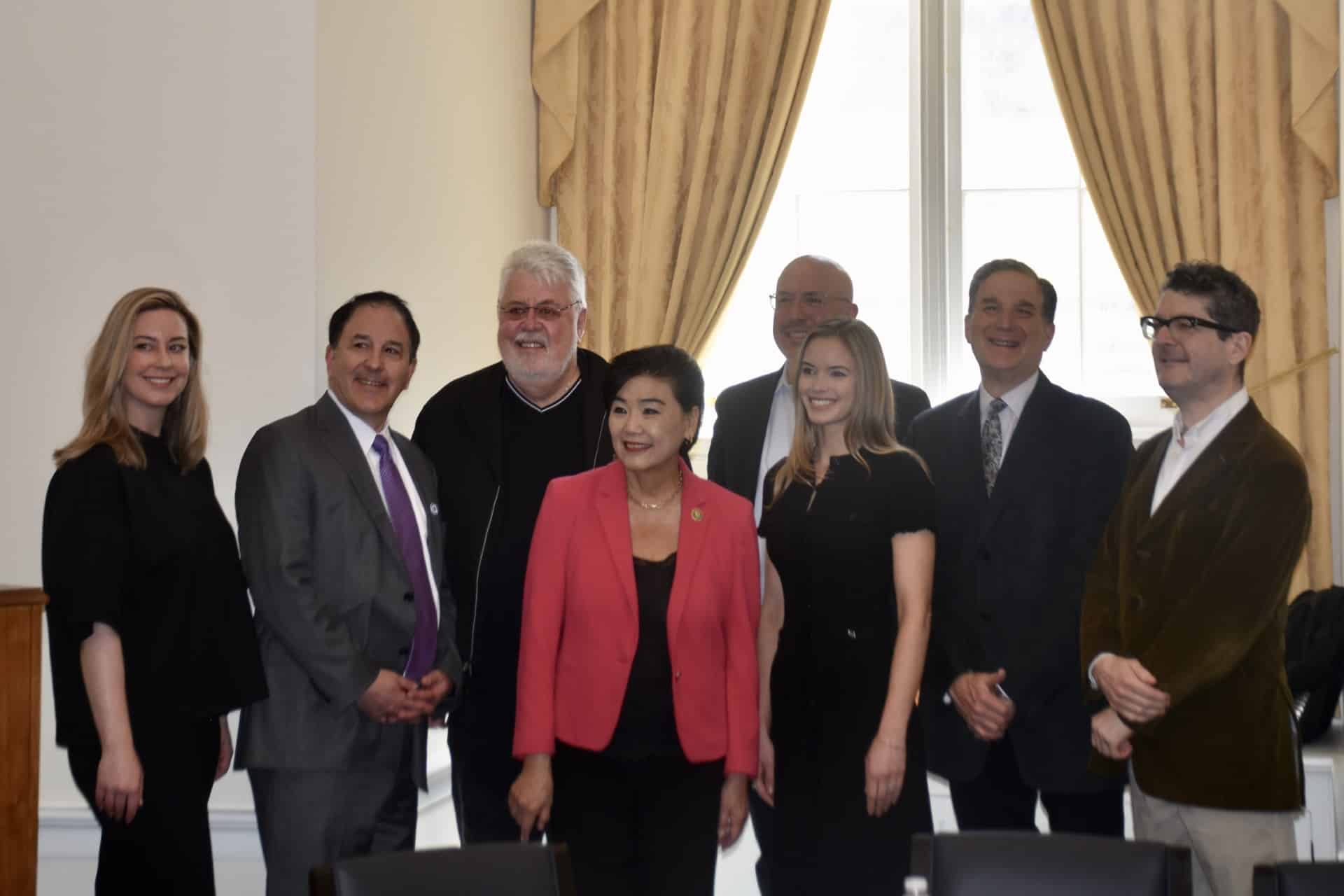

As chair of the National Music Council of the United States (NMC), the Congressionally chartered umbrella organization of American music rights and education advocacy groups, I am both disappointed and dismayed by the apparent, abrupt cancellation of US Government grants to numerous American arts and music education and performance programs and initiatives across the country.
I am equally concerned over the deleterious effects on American musical culture that will likely result from plans to dismantle the National Endowment for the Arts, an agency dedicated to ensuring the continued pre-eminence of American music as the platinum standard for creative excellence throughout the world.
Over the past century and a half, American composers, songwriters and recording artists have utterly dominated global musical culture in popularity. A recent recording industry study found that American songs and recordings continue to comprise a huge percentage of the music charts throughout the world, often constituting upward of an astonishing 90% of the top numerical positions. As a result, the US music industry contributes well over $200 billion annually to the American economy, supporting in part some 2.5 million domestic jobs and over 250,000 music venues and establishments.
Just this past week in Washington, DC, I pointed out before members of Congress on behalf of NMC that even statistics as eye-popping as those tell only a part of the story behind the economic and cultural engine that is American music. This level of sustained achievement stands as a living tribute to the unique quality of America’s creative melting-pot. Starting in the 1800s with the synthesis of musical influences from around the world into jazz, gospel, folk and blues, the US music creator community –supported by legal protections and economic incentives provided by the US Government through laws, grants and other opportunities– has succeeded in fostering the advancement of the musical arts in America to the very highest levels of human achievement and commercial success.
And the benefits of this phenomenon go even deeper than the billions in US GDP they produce. By consistently creating the music the world loves, the United States has realized political, social and economic value far beyond the balance of trade benefits music sustains. It has, in fact, helped produce the rarest of all geo-political commodities: lasting and broad good will.
NMC has already placed itself in the forefront of efforts to remind Congress and the White House of the multitude of cultural, economic, and political benefits that flow from the output of the most successful and creative musical community in world history. Our message is a simple one. American music creators have reached those heights in important part through energetic, governmental support for music education, development and performance. That formula must not be abandoned. It would be utter folly to curtail investment in one of the most brilliant sectors of American life, culture and commerce, putting an end to one of America’s greatest stories of success.
We shall keep you posted on further developments.
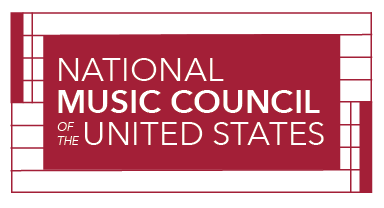
On behalf of the undersigned national, state, and local organizations, and in support of tens of millions of students and parents across America, we urge Congress to grant the full, authorized amount of $1.6 billion in Fiscal Year 2026 for the Student Support and Academic Enrichment grant program known as Title IV-A. This bipartisan, flexible block grant supports investments in well-rounded education programs and the effective use of technology in education throughout the United States, and is authorized under the longstanding, nonpartisan Every Student Succeeds Act.
Robust and consistent funding under Title IV-A helps ensure districts are able to provide a full array of learning opportunities that improve academic progress for all students, a crucial element to our national success in a competitive, global economy. As a formula-based program focused on
locally-determined use of funds, the grant ensures that a broad range of districts throughout the nation continue to have resources they can direct in a manner that best addresses their particular needs. Title IV-A has continuously maintained bipartisan support in part because of the flexibility it affords states and districts to implement programming tailored to their own community’s requirements and priorities.
Our 2024 survey of over 850 unique districts across the nation shows that 85% of district leaders fully endorse the program’s local-control flexibility. To that point, when asked about how districts invested such discretionary funds, districts cited a wide-range of permissible target initiatives, including funding of STEM and computer science programs, career and technical education, music and the arts, International Baccalaureate and Advanced Placement courses (IB and AP), physical education, health, professional development for use of educational technology, violence prevention, behavioral responsibility and much more. Survey data also reveals that without increased funding, the expansion of existing programs and creation of new programs would not be possible.
It is noteworthy that Title IV-A is the funding stream that currently sustains many of the activities districts had previously been using limited Elementary and Secondary School Emergency Relief Fund (ESSER) dollars to support. With ESSER emergency funds often fully expended and inflationary pressures persisting, districts are looking for alternatives to continue investing in programs that have demonstrably made a difference in closing achievement gaps, including intensive academic tutoring, afterschool and summer enrichment programs, and mentoring for at-risk students. When asked about whether districts would have to scale back these programs without greater assistance, hundreds of districts responded that such service cuts seem inevitable without full Title IV-A funding.
In sum, Federal investment under Title IV-A is absolutely essential to providing access to the kind of well-rounded education necessary for American students to thrive in a modern society and workforce. For these reasons, we urge Congress to continue its bipartisan investment in the Title IV-A program by funding it at its fully authorized level of $1.6 billion in FY 2026. Furthermore, we urge Congress to take an active role in ensuring that this funding is timely disbursed by the US Government to recipients with fidelity and adherence to the laws which Congress has passed.
Thank you for your consideration of this request. We look forward to working with you to ensure these investments continue to support districts, educators, and students in a manner tailored to their individualized needs.
THE NATIONAL MUSIC COUNCIL OF THE UNITED STATES
The National Music Council of the United States is celebrating its 82nd year as a forum for the free discussion of the nation’s national music affairs and challenges. Founded in 1940 to act as a clearinghouse for the joint opinion and decision of its members and to work to strengthen the importance of music in our lives and culture, the Council’s initial membership of 13 has grown to almost 50 national music organizations, encompassing every important form of professional and commercial musical activity. Through the cooperative work of its member organizations, the National Music Council promotes and supports music and music education as an integral part of the curricula in the schools of our nation, and in the lives of its citizens. The Council provides for the exchange of information and coordination of efforts among its member organizations, and speaks with one voice for the music community whenever an authoritative expression of opinion is desirable. www.musiccouncil.org
Sincerely,
The Board of Directors
National Music Council of the United States
On January 24th, the National Music Council of the United States honored singer-songwriter and music education advocate Rosanne Cash with the prestigious American Eagle Award “In Recognition of Her Indelible Contributions to American & Global Musical Culture as a Beloved Recording Artist, Performer, Composer, Educator, Activist, Altruist and Ambassador for American Music to the World.” The 41st annual American Eagle Awards were held in Anaheim, California at the 2025 NAMM Show.
One of the country’s pre-eminent singer-songwriters and music education advocates, Rosanne Cash has earned 4 Grammys and is also the author of four books including the best-selling memoir “Composed,” which the Chicago Tribune called “one of the best accounts of an American life you’ll likely ever read.” Among her many honors, Ms. Cash has been awarded the SAG/AFTRA Lifetime Achievement Award for Sound Recordings and the Smithsonian Ingenuity Award in the Performing Arts. She has also served as a Carnegie Hall Perspectives artist, was an Artist-In-Residence at the Country Music HOF and Museum, and is currently Artist-in-Residence at New York University. Rosanne is likewise one of only a handful of women to be elected to the Nashville Songwriters Hall of Fame, a number she hopes to see increase in the near future.
The ceremony was hosted by NMC President James Weaver, who also conducted an interview with the honoree on her life and work following the special award presentation. The award itself was presented by internationally renowned composer and recording artist Jackson Browne.
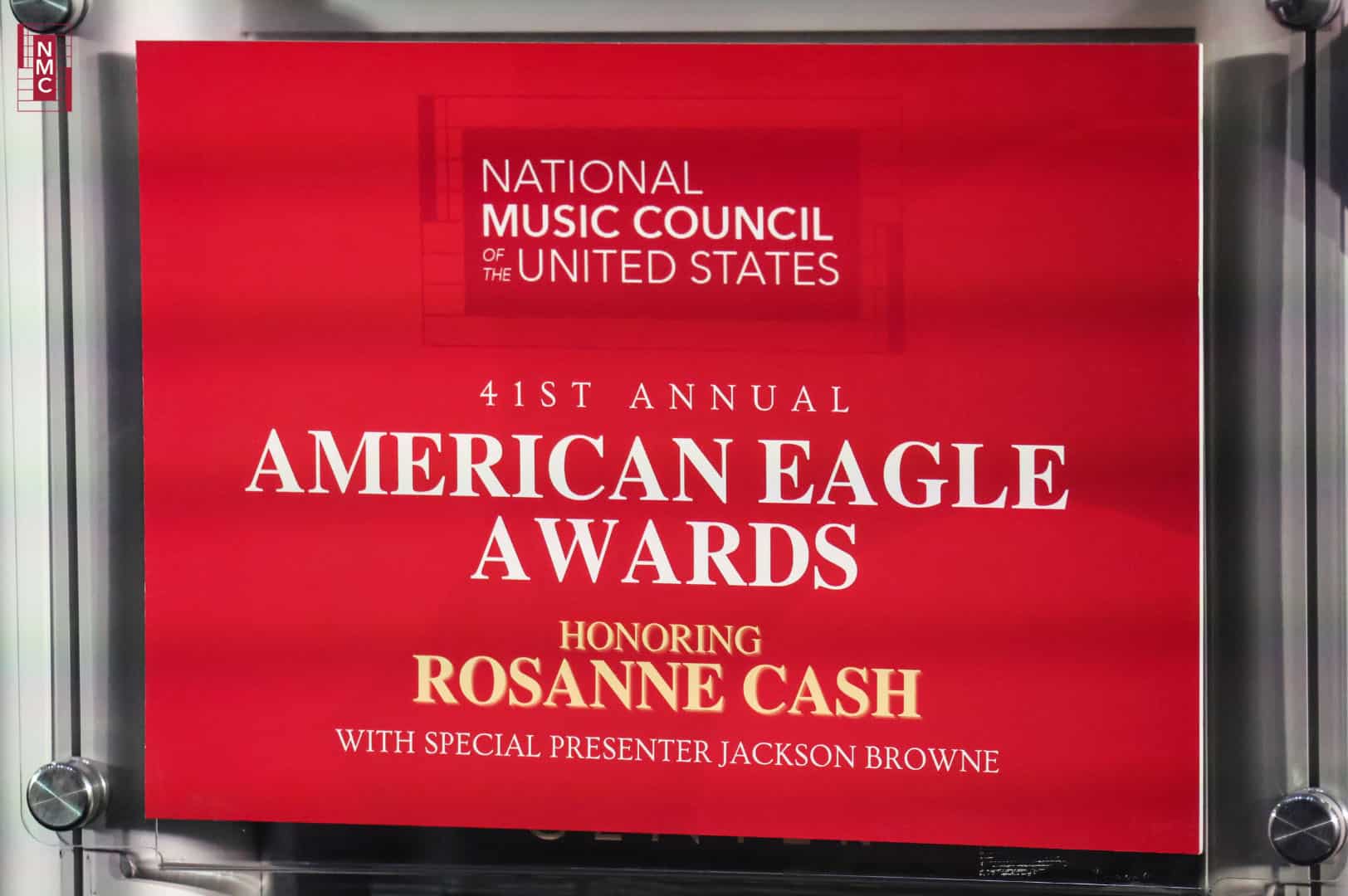
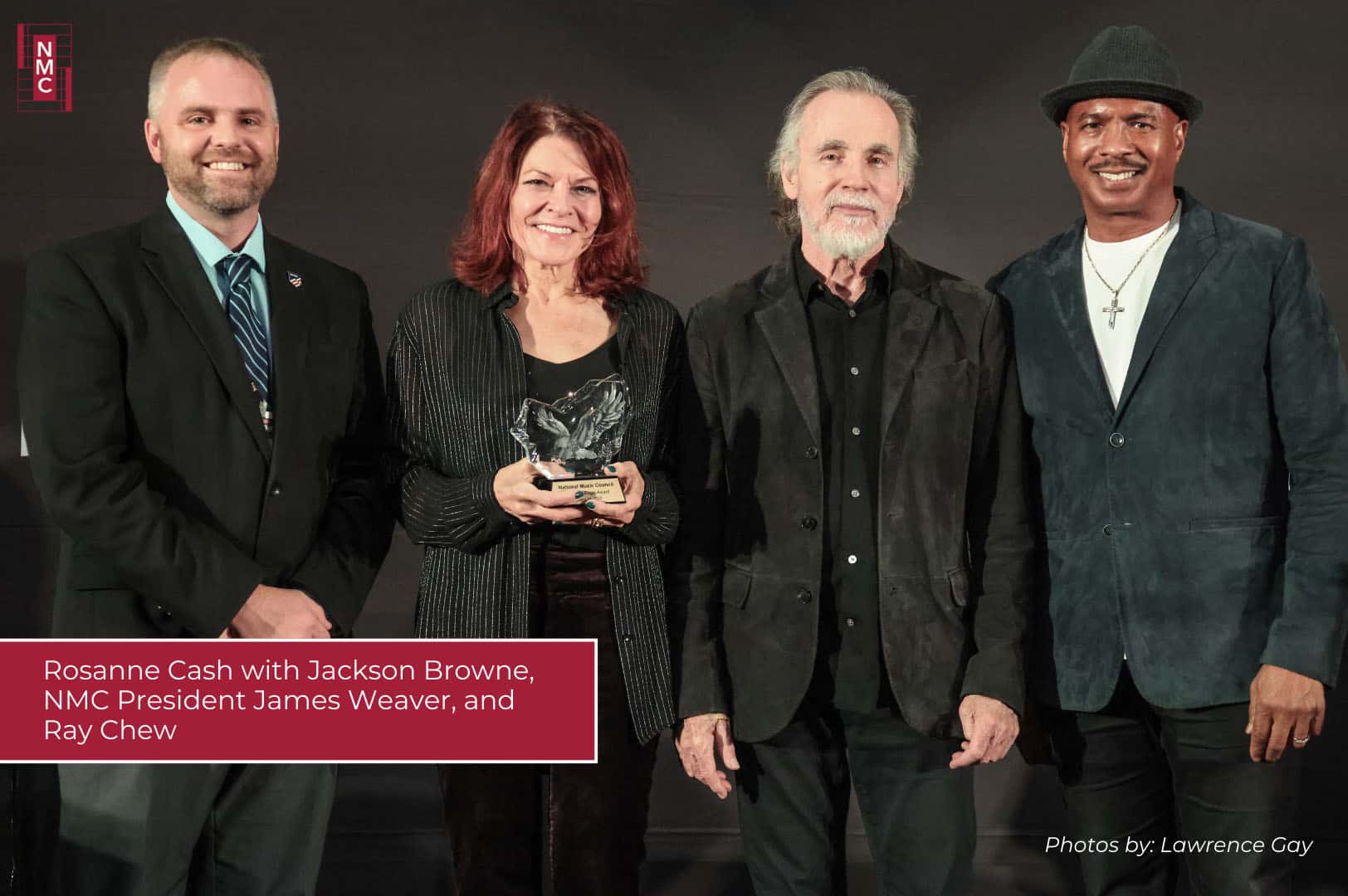
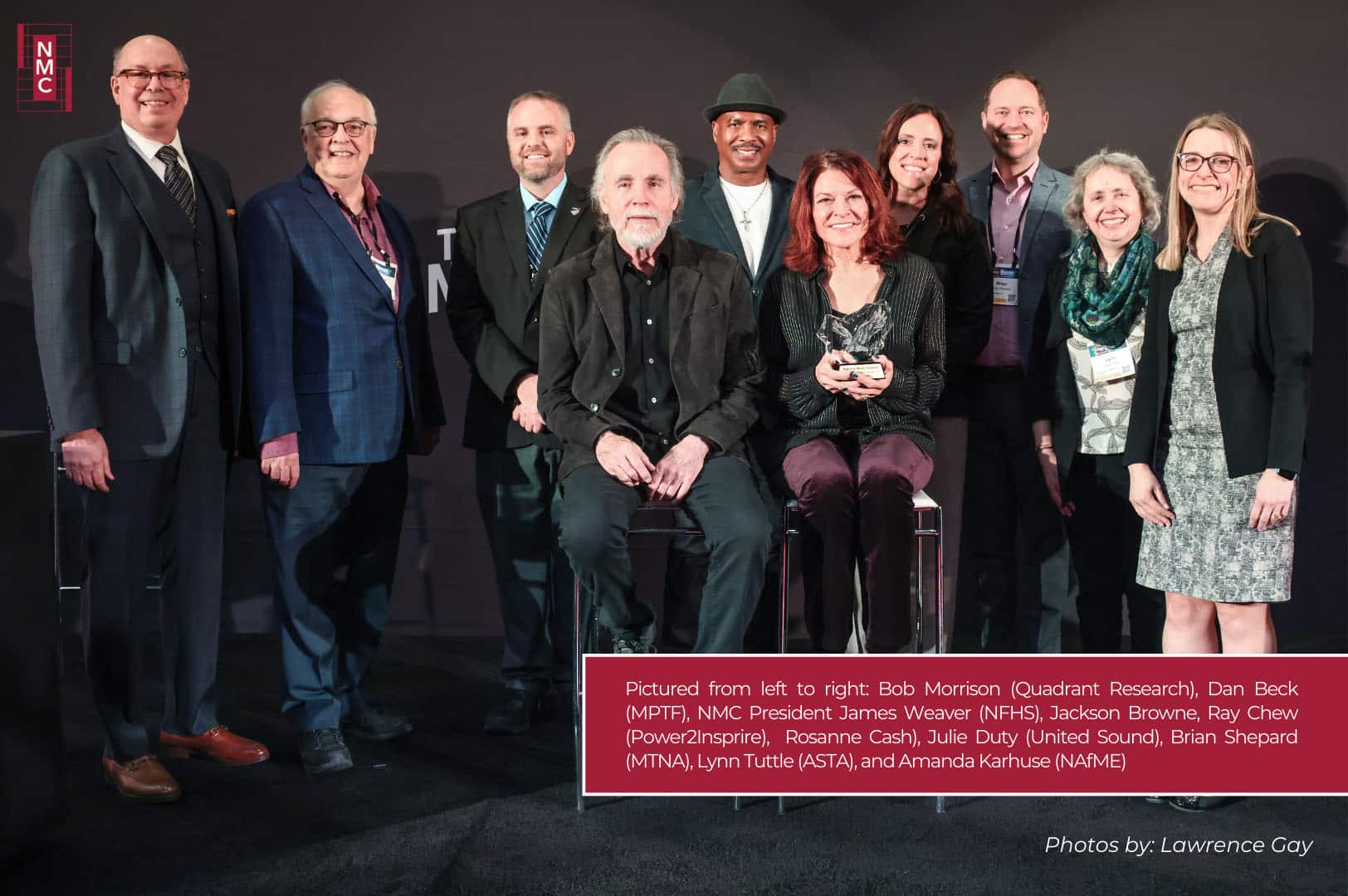

Renowned for his extraordinary talent as a songwriter and performer, Peter was equally celebrated for his boundless energy as a social activist, standing alongside luminaries like Dr. Martin Luther King Jr., Pete Seeger, and Harry Chapin. Whether performing with Mary Travers and Noel Paul Stookey or lending his voice to vital causes, Peter brought warmth, enthusiasm, and an unwavering willingness to help wherever it was needed.
We extend our heartfelt condolences to his family, friends, and the countless lives he touched. May his legacy—and the enduring magic of Puff the Magic Dragon—continue to inspire and bring joy to future generations.
July 8, 2024, NEW YORK CITY–The National Music Council of the United States (NMC) has issued an educational, legislative-based statement outlining the general consensus views of the American music creators, copyright owners and educators that constitute its broad membership, concerning both the opportunities and the existential dangers posed by the rapid introduction of generative artificial intelligence (GenAI) systems throughout the U.S. and global music communities.
With billions of dollars and the future of American musical culture at stake, NMC states that it is seeking to provide the basis through the attached statement for a more informed and far-reaching dialogue among creators, copyright owners, business leaders, technologists, legislators, students, educators and members of the public regarding the need for measured legislative action and governmental oversight to ensure fairness and equity in the GenAI marketplace.
According to NMC Chair Charles J. Sanders, “GenAI has the capacity – using pre-existing copyrighted works to produce new derivatives – to enhance human musical expression and public enjoyment of the musical arts through fairness in voluntary licensing, or to cause long standing, crushing and potentially irreparable damage to musical creativity, commerce and culture. Our goal is to support the best possible legislative outcomes for our organizational members and their constituencies, leading to ever-increasing advancement of human-centric musical excellence, progress, equity and cultural preservation around the world.” NMC President Dr. James Weaver adds “the issues covered in the document include the general principles of consent, credit, fair compensation, disclosure, record keeping, and a necessarily narrow application of any exceptions to infringement, limited to only certain, non-commercial exemptions in the area of education.”
Dr. David Sanders, NMC’s Executive Director, expressed his hope that the statement will help facilitate rapid, legislative progress toward protecting the rights of creators, copyright administrators and educators through cooperative discussion. “Our paper is intended as an educational primer designed to demonstrate both support of our membership for AI technology in general, but insistence in the context of GenAI on respect for the legal rights of the creative community – and for the principles of diversity, equity and inclusiveness which our community considers very high priorities.”
NMC is the Congressionally-chartered, educational umbrella organization for the broad spectrum of US music community advocacy groups. Founded in 1940, NMC’s membership is today comprised of almost fifty leading American trade organizations representing four distinct categories of music community interests: those of music creators; musical artists & performers; music copyright owners & administrators; and, music educators. In all cases and on every issue, each member organization explicitly retains the authority to speak independently on its own behalf, regardless of whether the views it expresses differ from those of NMC and/or other NMC members. Click here to read the GEN AI statement. For more information on NMC, please visit musiccouncil.org.
